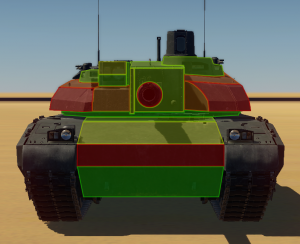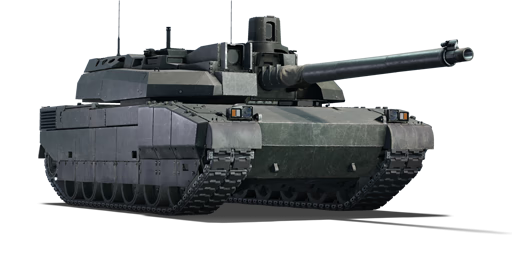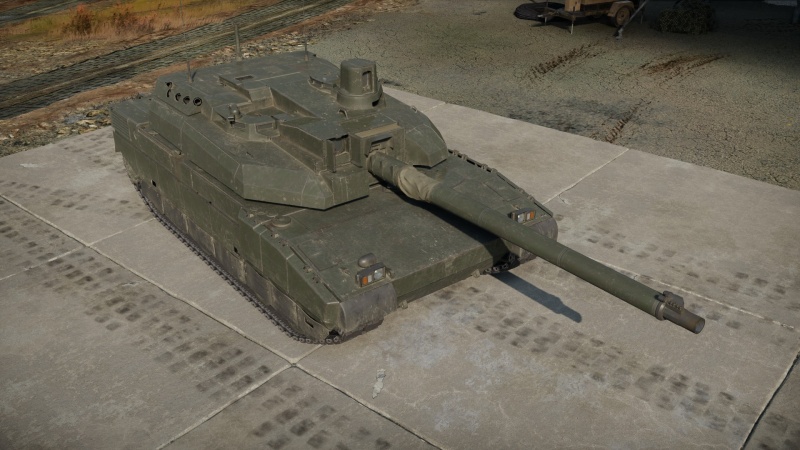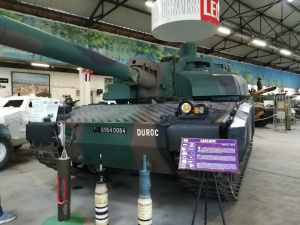Difference between revisions of "Leclerc"
(Updated format) |
|||
| Line 6: | Line 6: | ||
== Description == | == Description == | ||
<!-- ''In the description, the first part should be about the history of the creation and combat usage of the vehicle, as well as its key features. In the second part, tell the reader about the ground vehicle in the game. Insert a screenshot of the vehicle, so that if the novice player does not remember the vehicle by name, he will immediately understand what kind of vehicle the article is talking about.'' --> | <!-- ''In the description, the first part should be about the history of the creation and combat usage of the vehicle, as well as its key features. In the second part, tell the reader about the ground vehicle in the game. Insert a screenshot of the vehicle, so that if the novice player does not remember the vehicle by name, he will immediately understand what kind of vehicle the article is talking about.'' --> | ||
| − | |||
| − | |||
The '''{{Specs|name}}''' is a rank {{Specs|rank}} French medium tank {{Battle-rating}}. It was introduced in [[Update 1.89 "Imperial Navy"]]. | The '''{{Specs|name}}''' is a rank {{Specs|rank}} French medium tank {{Battle-rating}}. It was introduced in [[Update 1.89 "Imperial Navy"]]. | ||
| Line 32: | Line 30: | ||
=== Modifications and economy === | === Modifications and economy === | ||
{{Specs-Economy}} | {{Specs-Economy}} | ||
| + | |||
| + | The OFL 120 F1 round is the most important module to research for the Leclerc, followed closely by NVD (thermals help maintain a comfortable advantage over opponents). | ||
| + | |||
| + | Parts and FPE should be the first modules researched, followed by Adjustment of Fire, Crew Replenishment, your choice of Laser Rangefinder or Smoke Grenades, then OFL 120 F1, NVD, and ideally mobility upgrades afterwards. | ||
== Armaments == | == Armaments == | ||
| Line 185: | Line 187: | ||
* '''[[Leopard 2A5|Ariete]]:''' although its armor protection won't stop your APFSDS, almost all the tank is vulnerable to Ariete's firepower, in fact its rounds can easily penetrate most of the frontal section of the Leclerc even at 2000 m. It is better to disable its gun before trying to destroy the tank, or just shooting at the left turret cheek, killing the gunner and the commander leaving the target harmless | * '''[[Leopard 2A5|Ariete]]:''' although its armor protection won't stop your APFSDS, almost all the tank is vulnerable to Ariete's firepower, in fact its rounds can easily penetrate most of the frontal section of the Leclerc even at 2000 m. It is better to disable its gun before trying to destroy the tank, or just shooting at the left turret cheek, killing the gunner and the commander leaving the target harmless | ||
| − | |||
| − | |||
| − | |||
| − | |||
| − | |||
| − | |||
| − | |||
| − | |||
| − | |||
| − | |||
| − | |||
| − | |||
| − | |||
| − | |||
| − | |||
| − | |||
| − | |||
| − | |||
| − | |||
| − | |||
| − | |||
| − | |||
| − | |||
| − | |||
| − | |||
| − | |||
| − | |||
| − | |||
| − | |||
| − | |||
| − | |||
| − | |||
| − | |||
| − | |||
| − | |||
| − | |||
| − | |||
| − | |||
| − | |||
| − | |||
| − | |||
| − | |||
| − | |||
| − | |||
| − | |||
=== Pros and cons === | === Pros and cons === | ||
| Line 249: | Line 206: | ||
== History == | == History == | ||
<!-- ''Describe the history of the creation and combat usage of the vehicle in more detail than in the introduction. If the historical reference turns out to be too long, take it to a separate article, taking a link to the article about the vehicle and adding a block "/History" (example: <nowiki>https://wiki.warthunder.com/(Vehicle-name)/History</nowiki>) and add a link to it here using the <code>main</code> template. Be sure to reference text and sources by using <code><nowiki><ref></ref></nowiki></code>, as well as adding them at the end of the article with <code><nowiki><references /></nowiki></code>. This section may also include the vehicle's dev blog entry (if applicable) and the in-game encyclopedia description (under <code><nowiki>=== In-game description ===</nowiki></code>, also if applicable).'' --> | <!-- ''Describe the history of the creation and combat usage of the vehicle in more detail than in the introduction. If the historical reference turns out to be too long, take it to a separate article, taking a link to the article about the vehicle and adding a block "/History" (example: <nowiki>https://wiki.warthunder.com/(Vehicle-name)/History</nowiki>) and add a link to it here using the <code>main</code> template. Be sure to reference text and sources by using <code><nowiki><ref></ref></nowiki></code>, as well as adding them at the end of the article with <code><nowiki><references /></nowiki></code>. This section may also include the vehicle's dev blog entry (if applicable) and the in-game encyclopedia description (under <code><nowiki>=== In-game description ===</nowiki></code>, also if applicable).'' --> | ||
| − | Development of the Leclerc main battle tank dates back to 1964, when the French military initiated a study on possible replacements for the AMX-30 tank, about to be introduced into service at the time. By the early | + | Development of the Leclerc main battle tank dates back to 1964, when the French military initiated a study on possible replacements for the AMX-30 tank, about to be introduced into service at the time. By the early '70s, the inferiority of the AMX-30 compared to more modern Soviet T-series MBTs had become obvious. As a result, work on developing a replacement officially began, with first specifications being drawn up by 1977. |
In 1980, France and Germany began joint development of a new main battle tank. However, similarly to the previous Europanzer development decades ago, the joint effort quickly came to an end shortly afterwards due to various disagreements, with France continuing work on its own. | In 1980, France and Germany began joint development of a new main battle tank. However, similarly to the previous Europanzer development decades ago, the joint effort quickly came to an end shortly afterwards due to various disagreements, with France continuing work on its own. | ||
| Line 255: | Line 212: | ||
The new main battle tank was intended to offer cutting-edge performance by making use of the latest equipment available. However, as the per unit price was projected to be substantial, France sought partnership with another state to reduce these costs. Eventually, a partnership was established with the UAE, who would be the second and only other primary operator of the new tank, other than France itself. | The new main battle tank was intended to offer cutting-edge performance by making use of the latest equipment available. However, as the per unit price was projected to be substantial, France sought partnership with another state to reduce these costs. Eventually, a partnership was established with the UAE, who would be the second and only other primary operator of the new tank, other than France itself. | ||
| − | Thus, in 1986 the tank received its name | + | Thus, in 1986 the tank received its name "Leclerc", with six initial prototypes being produced. Mass production subsequently started in 1990 and went on until 2007. During production, the Leclerc was built in various batches and series, each introducing various tweaks and changes to the design, while some also incorporated major upgrades. |
The Leclerc saw service as part of a number of UN peacekeeping missions, primarily in Kosovo and Lebanon, with reported favourable performance. Most recently, the UAE deployed a number of its Leclercs to Yemen, with some vehicles getting damaged. As of the end of production in 2007, a total of around 860 Leclercs were built for both French and UAE forces combined. | The Leclerc saw service as part of a number of UN peacekeeping missions, primarily in Kosovo and Lebanon, with reported favourable performance. Most recently, the UAE deployed a number of its Leclercs to Yemen, with some vehicles getting damaged. As of the end of production in 2007, a total of around 860 Leclercs were built for both French and UAE forces combined. | ||
| Line 283: | Line 240: | ||
* ''encyclopedia page on the tank;'' | * ''encyclopedia page on the tank;'' | ||
* ''other literature.'' --> | * ''other literature.'' --> | ||
| − | * [[wt:en/news/6177-development-leclerc-s1-la-r%C3%A9publique-s-finest-en|[Devblog] Leclerc S1 - La | + | * [[wt:en/news/6177-development-leclerc-s1-la-r%C3%A9publique-s-finest-en|[Devblog] Leclerc S1 - La République's Finest]] |
* [[wikipedia:GIAT_CN120-26/52|[Wikipedia] GIAT CN120-26/52]] | * [[wikipedia:GIAT_CN120-26/52|[Wikipedia] GIAT CN120-26/52]] | ||
{{France medium tanks}} | {{France medium tanks}} | ||
Revision as of 17:08, 28 December 2020
Contents
Description
The Leclerc Serie 1 is a rank VIII French medium tank with a battle rating of 12.0 (AB/RB/SB). It was introduced in Update 1.89 "Imperial Navy".
Developed by GIAT in the late 1980s, this variant of the Leclerc (the Serie 1) was the first production model. Despite this, it sports numerous modern technologies, a powerful NATO-compliant 120mm cannon equipped with an autoloader (as with many French tanks) and a powerful, advanced diesel engine with a gas turbine 'charger'.
General info
Survivability and armour

The Leclerc MBT is generally well protected with a well-designed layout resulting in good survivability. It does, however, have a number of prominent weak spots which are not easily hidden - most notable of which is the gun mantlet, which is mostly unprotected and can easily be penetrated to disable the cannon breech and often the tank commander, who sits on the exposed side of the mantlet (right side, looking from the front of the vehicle). The LFP (lower front plate) and UFP (upper front plate) are both weakly protected, with only the central front plate providing sufficient protection against incoming rounds. The Leclerc's turret cheeks are extremely well protected by modular composite armour, combining hard metals, semi-reactive and ceramic layers, protecting against even the most powerful kinetic rounds and most chemical rounds.
Despite only seating three crew members, the Leclerc's survivability proves to be reasonable, with spaced out crew members, a blow-out compartment for the primary ammunition storage and the turret crew placed as low as feasible. As such, even successful penetration of the Leclerc is unlikely to disable the vehicle immediately - and even a vehicle fire or crew knockout will not stop the vehicle from reloading, ready to fire back. It is possible to destroy the Leclerc with one round by hitting the two crew on the right (viewed from the front).
Mobility
| Game Mode | Max Speed (km/h) | Weight (tons) | Engine power (horsepower) | Power-to-weight ratio (hp/ton) | |||
|---|---|---|---|---|---|---|---|
| Forward | Reverse | Stock | Upgraded | Stock | Upgraded | ||
| Arcade | 80 | 42 | 53.7 | 2,285 | 2,862 | 42.55 | 53.3 |
| Realistic | 72 | 38 | 1,304 | 1,500 | 24.28 | 27.93 | |
The Leclerc is powered by an excellent V8 diesel engine with a gas turbine auxiliary charger, producing a peak of 1474.5 horsepower at 2500 RPM, transferred to the drive sprockets via a transmission with 8 forward and 4 backward gears. With a maximum power-to-weight ratio of 27.01, the Leclerc is more than capable of reaching these speeds, with excellent acceleration and manoeuvrability characteristics to boot. The Leclerc will easily keep up with most of its counterparts such as the M1A2 Abrams or the Leopard 2A5, and as such can comfortably reach strategic positions quickly or make its way into cap points with haste. It can also quickly escape sub-optimal situations, with a perfectly reasonable -38 km/h reverse speed.
Modifications and economy
The OFL 120 F1 round is the most important module to research for the Leclerc, followed closely by NVD (thermals help maintain a comfortable advantage over opponents).
Parts and FPE should be the first modules researched, followed by Adjustment of Fire, Crew Replenishment, your choice of Laser Rangefinder or Smoke Grenades, then OFL 120 F1, NVD, and ideally mobility upgrades afterwards.
Armaments
Main armament
The Leclerc Serie 1 mounts a 120 mm GIAT CN120-26/52 smoothbore cannon, fitted with a two-plane stabiliser and an autoloading system. The CN120 is a competitive cannon, displaying excellent performance with the OFL 120 F1 APFSDS round, up to a maximum of 528 mm of penetration at 0°. Combined with the consistent 6 second reload (independent of crew), this 120 mm cannon is more than competitive when compared to the offerings on its contemporaries. However, it's important to note that the OFL 120 F1 round is a tier 4 modification, and as such a stock Leclerc will be required to use the OCC 120 G1 HEAT-FS round - which, while capable, can prove somewhat unreliable when used against late vehicles with ERA and composite armour.
| 120 mm GIAT CN120-26 F1 | Turret rotation speed (°/s) | Reloading rate (seconds) | |||||||||||
|---|---|---|---|---|---|---|---|---|---|---|---|---|---|
| Mode | Capacity | Vertical | Horizontal | Stabilizer | Stock | Upgraded | Full | Expert | Aced | Stock | Full | Expert | Aced |
| Arcade | 40 | -8°/+20° | ±180° | Two-plane | 28.60 | __.__ | __.__ | __.__ | __.__ | 6.00 | 6.00 | 6.00 | 6.00 |
| Realistic | 17.90 | __.__ | __.__ | __.__ | __.__ | ||||||||
Ammunition
| Penetration statistics | |||||||
|---|---|---|---|---|---|---|---|
| Ammunition | Type of warhead |
Penetration @ 0° Angle of Attack (mm) | |||||
| 10 m | 100 m | 500 m | 1,000 m | 1,500 m | 2,000 m | ||
| OCC 120 G1 | HEATFS | 480 | 480 | 480 | 480 | 480 | 480 |
| OFL 120 G1 | APFSDS | 394 | 393 | 388 | 382 | 376 | 370 |
| OFL 120 F1 | APFSDS | 575 | 573 | 565 | 557 | 547 | 537 |
| Shell details | |||||||||
|---|---|---|---|---|---|---|---|---|---|
| Ammunition | Type of warhead |
Velocity (m/s) |
Projectile Mass (kg) |
Fuse delay (m) |
Fuse sensitivity (mm) |
Explosive Mass (TNT equivalent) (g) |
Ricochet | ||
| 0% | 50% | 100% | |||||||
| OCC 120 G1 | HEATFS | 1,100 | 14.4 | 0.0 | 0.1 | 2,148 | 65° | 72° | 77° |
| OFL 120 G1 | APFSDS | 1,650 | 3.8 | N/A | N/A | N/A | 78° | 80° | 81° |
| OFL 120 F1 | APFSDS | 1,790 | 3.8 | N/A | N/A | N/A | 78° | 80° | 81° |
Ammo racks
| Full ammo |
1st rack empty |
2nd rack empty |
3rd rack empty |
4th rack empty |
5th rack empty |
6th rack empty |
Visual discrepancy |
|---|---|---|---|---|---|---|---|
| 40 | __ (+__) | __ (+__) | __ (+__) | __ (+__) | __ (+__) | __ (+__) | __ |
Optics and night vision
The Leclerc receives night vision imagers once the tier 4 modification 'NVD' is researched. This unlocks 800 x 600 resolution thermal sights for both the gunner and commander, as well as standard image intensifiers for all crew (available in third person view in AB/RB additionally)
| Leclerc Optics | ||||||
|---|---|---|---|---|---|---|
| Type of optic | Magnification | Night Vision Devices | ||||
| Image Intensifier | Thermal Imager Resolution |
Notes | ||||
| Resolution | Light Mult | Noise Level | ||||
| Gunner's Sight | 4.0x - 12.0x | -- | -- | -- | 800 x 600 | Intensifier & thermal sights unlocked by 'NVD' modification (tier 4) |
| Commander's View | 6.0x | -- | -- | -- | 800 x 600 | Intensifier & thermal sights unlocked by 'NVD' modification (tier 4) |
| Driver's View | 1.0x | 1200 x 800 | 7.0 | High | N/A | Intensifier unlocked by 'NVD' modification (tier 4) |
Machine guns
The Leclerc mounts a single coaxial 12.7mm machine gun. While this coaxial mount limits it to +20° of elevation, if it can be placed on target it can prove effective against low-flying aircraft. Besides this, it can be useful for clearing out light obstacles, knocking out crew on open-top vehicles, and marking targets.
| 12.7 mm M2HB | ||||
|---|---|---|---|---|
| Mount | Capacity (Belt capacity) |
Rate of fire (shots/minute) |
Vertical guidance |
Horizontal guidance |
| Coaxial | 800 (200) | 576 | N/A | N/A |
Usage in battles
The Leclerc is an extremely capable MBT, and can be deadly in the right hands. It can prove somewhat vulnerable in close-range engagements, where its numerous weak points are easily targeted, and as such it's preferable to make use of its high round velocity to snipe, or its excellent mobility to flank enemies.
Rural Combat
The Leclerc's OFL 120 F1 round, with its 1,790 m/s muzzle velocity and high penetration values is a potent sniping round. As such, on open maps (such as Kursk or Maginot Line), it's recommended to operate the Leclerc as a sniper - this allows it to both employ these round characteristics optimally and avoid the Leclerc's large weak spots being easy targets. On maps where flanking is viable (for example, the eastern hill on Maginot Line), the Leclerc's excellent power to weight ratio can be used to access and push through these routes.
Urban Combat
The Leclerc is less comfortable in urban combat situations, although still more than capable. On maps such as Alaska, it's preferable to take flanking routes around the edges of urban regions where possible or cap points on the outskirts of the map (such as the A point in Alaska Domination), avoiding close quarters. In situations where avoiding close quarters is mostly impossible, it's best to play conservatively and maintain full awareness of enemy presence (audio is extremely important information in War Thunder - you can hear most vehicles coming!). Fortunately the Leclerc has a respectable reverse speed of 38 km/h and providing your engine, transmission and driver remain intact after a penetration it's more than capable of reversing out of trouble.
Notable Targets
- Challenger 2: The CR2's turret cheeks are essentially immune to even OFL 120 F1 - and the Challenger is deadly accurate at long range. As such, sniping matches with the Challenger 2 should be avoided at all costs, instead attempt to flank it where possible. If there is no opportunity to get closer, move around between shots and try to land a shot on the gun mantlet or the UFP/LFP.
- M1A1/M1A2 Abrams: The Abrams is a deadly opponent, and thanks to the crew and module spacing will often survive multiple shots. In any engagement, first try to disable the cannon breech - this avoids the Abrams firing back and with your quick reload you'll often have time to disable its mobility entirely.
- Leopard 2A5: The Leopard 2A5 is a dangerous opponent, with a small gun mantlet weak spot and impenetrable turret cheeks. Fortunately, the OFL 120 F1 round can punch straight through the hull. If the opportunity for a hull shot does not arise, try to shoot through the gun mantlet or turret ring where possible.
- Ariete: although its armor protection won't stop your APFSDS, almost all the tank is vulnerable to Ariete's firepower, in fact its rounds can easily penetrate most of the frontal section of the Leclerc even at 2000 m. It is better to disable its gun before trying to destroy the tank, or just shooting at the left turret cheek, killing the gunner and the commander leaving the target harmless
Pros and cons
Pros:
- Six second autoloader is very competitive
- Extremely good composite protection on turret cheeks and centre frontal plate
- Well-spaced crew and modules
- Blow-out contained primary ammunition storage
- Extremely mobile, with excellent acceleration and manoeuvrability characteristics
- Very effective kinetic round
Cons:
- Only three crew members
- Numerous large vulnerabilities
- Only HEAT-FS available stock, has to research APFSDS as a tier 4 modification
History
Development of the Leclerc main battle tank dates back to 1964, when the French military initiated a study on possible replacements for the AMX-30 tank, about to be introduced into service at the time. By the early '70s, the inferiority of the AMX-30 compared to more modern Soviet T-series MBTs had become obvious. As a result, work on developing a replacement officially began, with first specifications being drawn up by 1977.
In 1980, France and Germany began joint development of a new main battle tank. However, similarly to the previous Europanzer development decades ago, the joint effort quickly came to an end shortly afterwards due to various disagreements, with France continuing work on its own.
The new main battle tank was intended to offer cutting-edge performance by making use of the latest equipment available. However, as the per unit price was projected to be substantial, France sought partnership with another state to reduce these costs. Eventually, a partnership was established with the UAE, who would be the second and only other primary operator of the new tank, other than France itself.
Thus, in 1986 the tank received its name "Leclerc", with six initial prototypes being produced. Mass production subsequently started in 1990 and went on until 2007. During production, the Leclerc was built in various batches and series, each introducing various tweaks and changes to the design, while some also incorporated major upgrades.
The Leclerc saw service as part of a number of UN peacekeeping missions, primarily in Kosovo and Lebanon, with reported favourable performance. Most recently, the UAE deployed a number of its Leclercs to Yemen, with some vehicles getting damaged. As of the end of production in 2007, a total of around 860 Leclercs were built for both French and UAE forces combined.
- From Devblog
Media
- Skins
- Images
- Videos
See also
Links to the articles on the War Thunder Wiki that you think will be useful for the reader, for example:
- reference to the series of the vehicles;
- links to approximate analogues of other nations and research trees.
External links
| France medium tanks | |
|---|---|
| M4 Derivatives | M4A1 (FL10) · M4A4 (SA50) |
| AMX-50 | AMX M4 · AMX-50 (TOA100) · AMX-50 (TO90/930) |
| AMX-30 | AMX-30 · AMX-30 (1972) · AMX-30B2 · AMX-30B2 BRENUS · AMX-30 ACRA · AMX-30 Super |
| AMX-32/40 | AMX-32 · AMX-32 (105) · AMX-40 |
| Leclerc | Leclerc · Leclerc S2 · Leclerc SXXI · Leclerc AZUR |
| Other | D2 · S.35 · Lorraine 40t |
| Germany | Panther "Dauphiné" |
| USA | ▄M4A1 · ▄M4A3 (105) · ▄M4A4 · ▄M26 |
- Ground vehicles
- France ground vehicles
- Eighth rank ground vehicles
- Medium tanks
- Ground vehicles with explosive reactive armour
- Ground vehicles with composite armour
- Ground vehicles with smoke grenades
- Ground vehicles with night vision device
- Ground vehicles with thermal sight
- Ground vehicles with autoloader
- Ground vehicles with gun stabilizer







